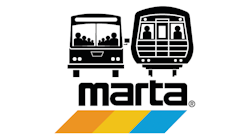Six mobility projects among Civic Innovation Challenge grant awards
Six mobility focused pilot programs have been granted up to $1 million through the Civic Innovation Challenge. The challenge is a partnership between the U.S. National Science Foundation (NSF), U.S. Department of Homeland Security and the U.S. Department of Energy (DOE).
The challenge consists of two tracks, Track A, which addresses mobility challenges, and Track B, which addresses resilience priorities. Track A is funded by NSF and DOE and focuses on “better mobility options to solve the spatial mismatch between affordable housing and jobs, as well as access to services like food and childcare.”
“We applaud the efforts of all the teams who worked tirelessly to build partnerships between researchers and community stakeholders,” said NSF Director Sethuraman Panchanathan. “We are excited to see the teams selected for the next phase begin their pilot projects and plant seeds of innovation across the country. This program demonstrates the value of research-community partnerships in rapidly translating cutting-edge science into community-based innovation and we look forward to seeing its positive impact across urban and rural communities.”
The awards for Track A include:
- Connecting Underrepresented Youths with Employment Opportunities, led by the University of Kansas Center for Research, Inc., will build and test an integrated mobile application to help underrepresented youth find and access out-of-school-time learning opportunities.
- Piloting On-Demand Multimodal Transit in Atlanta, led by the Georgia Tech Research Corporation, will synchronize on-demand shuttle services with Metropolitan Atlanta Rapid Transit Authority (MARTA) services and real-time feeds and deploy these services in targeted transit deserts. MARTA says this small-scale pilot project will test the system’s efficiency and provide information on whether a large-scale version would work across MARTA’s service area as the agency is undertaking a comprehensive redesign of its bus network. The service will be tested in areas where there is a need for greater transit accessibility in DeKalb, Clayton and Fulton Counties and the city of Atlanta.
- Co-Creating a Community Hub for Smart Mobility, led by The University of Texas at Austin, will work with the nonprofit Jail to Jobs, local community members and civic partners to create a hub in north Austin’s Georgian Acres neighborhood that provides first/last mile mobility options to reduce commute times, decrease costs and understand the social and economic impacts of these disparities. The hub will provide access to a neighborhood bike system, a bike-share station, e-scooter stations and more while offering free Wi-Fi and other community services such as a mobile health clinic and food pantry.
- User-Centered Mobility Solutions: A New Vision to Connect Jobs and the Labor Force, led by the University of Wisconsin Milwaukee, will test and compare two models – labor force-centered and employer-centered – for overcoming financial and institutional barriers for regional mobility services. The mobility technologies set to be implemented for this program include transport network companies and microtransit to directly address the mobility needs of the labor force and employers. Researchers say the success of the pilot program “will serve as a new user-centered model for other U.S. metropolitan areas with significant spatial mismatches.”
- Civic Bicycle Commuting, or CiBiC, led by the University of California, Los Angeles Center for Research in Engineering, Media and Performance, will launch a unique community-driven mobile app and participatory media cartography to enable and support collective bike commuting involving more than 200 participants from underserved communities in northeast downtown Los Angeles.
- A community-based framework to develop Shared MicromobIlity for affordabLe-accessIblE housing, or SMILIES, led by the University of Arkansas, will work with the community to design and deploy services in high-priority neighborhoods in Fort Smith, Ark. The project will estimate the impact of shared micromobility services, such as e-bikes and e-scooters, on household travel and costs, job access and more.
The six awards from Track A are part of the $15.9 million in grants awarded to 17 projects as part of the challenge. Not only did the challenge have two tracks, but two stages, as well. Stage 1 awarded planning grants to 52 teams across 30 states as well as tribal regions, Puerto Rico and Washington, D.C., to refine concepts for projects designed to address use-inspired issues in their communities. The 17 teams selected in Stage 2, including the six mobility projects, will conduct and evaluate 12-month pilot projects and collaborate across the entire program, sharing approaches and positioning projects to have wider impact.
On its participation in the multimodal on-demand project, MARTA expressed gratitude for the grant and pride in partnering with Georgia Tech on the project.
“Exploring first- and last-mile connectivity options is important in providing transit service that meets the needs of everyone in metro Atlanta,” said MARTA Deputy General Manager Collie Greenwood.
Professor Pascal Van Hentenryck and Georgia Tech’s Industrial and Systems Engineering (ISyE) team is providing the technology, including routing logic, and rider, operator and administrator system apps for the project.
“MARTA’s leadership is very forward-thinking, and they are working to determine the future of public transportation,” said Van Hentenryck. “They have been extremely collaborative throughout the process and provided us with vast amounts of data and insights to drive the process.”
In Austin, the pilot project was designed as a custom solution specifically for Georgian Acres.
“Georgian Acres is bound on all sides by highways and high-speed roadways, making it difficult for community members to travel in or out of the neighborhood," said Austin's Assistant City Manager Gina Fiandaca, who oversees mobility. "It’s also a traditionally low- to moderate-income community, which means that affordability is a significant barrier to transportation for these residents. Our hope is that this community hub project will provide a variety of affordable transportation options, empowering community members to select the modes that best meet their needs."
With guidance from the community, the project team proposed co-creating a mobility hub with the community that provides first- and last-mile mobility options to reduce commute times, decrease transportation costs and understand the social and economic impacts of these disparities. Junfeng Jiao, associate professor, Community and Regional Planning program at UT School of Architecture and the team’s principal investigator, suggested that the same framework of a community-driven process could be used for other areas of town that traditionally have lacked transportation access and infrastructure.
"We want to make it very customized," said Jiao. "We are not going to design a one-size-hub-for-all. This community might have a different travel pattern compared to downtown or another Austin neighborhood. We want to co-create the hub to satisfy the neighborhood's unique needs."

Mischa Wanek-Libman | Group Editorial Director
Mischa Wanek-Libman is director of communications with Transdev North America. She has more than 20 years of experience working in the transportation industry covering construction projects, engineering challenges, transit and rail operations and best practices.
Wanek-Libman has held top editorial positions at freight rail and public transportation business-to-business publications including as editor-in-chief and editorial director of Mass Transit from 2018-2024. She has been recognized for editorial excellence through her individual work, as well as for collaborative content.
She is an active member of the American Public Transportation Association's Marketing and Communications Committee and served 14 years as a Board Observer on the National Railroad Construction and Maintenance Association (NRC) Board of Directors.
She is a graduate of Drake University in Des Moines, Iowa, where she earned a Bachelor of Arts degree in Journalism and Mass Communication.




